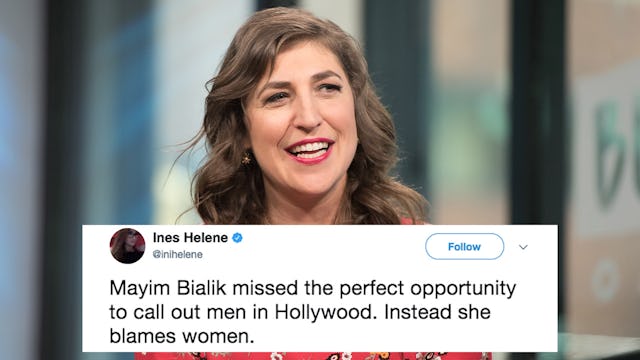Mayim Bialik's Weinstein Op-Ed Is A Victim-Blaming Mess

Bialik is facing major backlash regarding her thoughts on harassment in Hollywood
Big Bang Theory actress Mayim Bialik is coming under fire after writing an op-ed for the New York Times this weekend. In it, she addressed the Harvey Weinstein sexual harassment and abuse scandal in Hollywood.
She also used the op-ed as an opportunity to perpetuate the notion of victim-blaming while completely missing the mark on where we’re supposed to direct our outrage (hint: at the perpetrator).
She begins by talking about her long tenure in Hollywood — most of us remember her as a child actor in things like Beaches and her sitcom, Blossom. She says she’s not at all surprised about the Weinstein allegations: “I quickly learned even as a preteen actress that young girls with doe eyes and pouty lips who spoke in a high register were favored for roles by the powerful men who made those decisions.” So right off the bat, there are hints of victim-blaming.
She goes on to talk about her struggles with her own appearance, and how she was made to feel that way by producers and other casting agents growing up. Which is totally wrong, and super shitty. No one should make a child feel that way about what they look like — she admits she’s still plagued by insecurities about her looks today. But the op-ed takes a turn for the worse when she uses her own insecurities to separate herself from victims of sexual harassment in the industry:
“As a proud feminist with little desire to diet, get plastic surgery or hire a personal trainer, I have almost no personal experience with men asking me to meetings in their hotel rooms. Those of us in Hollywood who don’t represent an impossible standard of beauty have the ‘luxury’ of being overlooked and, in many cases, ignored by men in power unless we can make them money.”
OK, yeah, she lost us here because it sounds a lot like she’s trying to place the blame on girls and women who fit more “conventional” standards of beauty. And there ain’t nothing “feminist” about that. She also goes on to pat herself on the back for making “self-protecting” choices as an actress:
“I have decided that my sexual self is best reserved for private situations with those I am most intimate with. I dress modestly. I don’t act flirtatiously with men as a policy.”
Oh HELL to the no, honey. This just perpetuates the stigma surrounding harassment against women and implies that by dressing a certain way, or looking a certain way, it can be avoided altogether. Which is ridiculous and a dangerously ignorant take on the Weinstein abuse, and the abuse women of all ages, sizes, ethnicities, and socio-economic backgrounds face EVERY. SINGLE. DAY.
Twitter wasn’t having any of this nonsense either, with many women speaking out against Bialik’s views.
For her part, Bialik responded to the reactions earlier today:
What she doesn’t seem to realize is that these are her words, that she wrote herself, and there’s not really enough room in her very clear stance for any reader to take it “out of context.” She even ended her piece with these exact words:
“If you are beautiful and sexy, terrific. But having others celebrate your physical beauty is not the way to lead a meaningful life. And if — like me — you’re not a perfect 10, know that there are people out there who will find you stunning, irresistible and worthy of attention, respect and love. The best part is you don’t have to go to a hotel room or a casting couch to find them.”
Sorry, Mayim, but not only “perfect tens” get assaulted. And to imply women earn harassment based on how provocatively or conservatively a man thinks they’re dressed, or how they look, or the register of their voice is an irresponsible and perilous perception to put out into the world.
This article was originally published on